ENA - ENA English
Headlines
Ethiopian Cultural Troupe to Depart for China in First Leg of Trip Around World
Jul 18, 2025 225
Addis Ababa, July 18, 2025 (ENA) --- Ethiopian cultural troupe that consists of 70 members will depart for China in its first leg of a trip to different countries on July 20, 2025. The troupe will showcase the rich cultural assets of Ethiopia in different countries, it was learned. The troupe will showcase the rich cultural assets of Ethiopia in different countries, it was learned. Briefing the media today, Government Communication Service State Minister Tesfahun Gobezay said the aim of the trip is to display the cultural assets of Ethiopia to the rest of the world. The trip will open a new chapter in promoting the immense cultural assets of Ethiopia to the international community, he added. Art has a great contribution in promoting the values of a country, the state minister noted, adding that the trip would enhance the nation’s cultural diplomacy and people-to-people relations. Moreover, Tesfahun pointed out that such a trip is of paramount significance in increasing tourism, investment and building national image of the country. Culture and Sports State Minister Nebiyou Baye said the rich cultural assets of Ethiopia have not been promoted properly to the international community. The state minister added that the trip of the troupe would have immense contribution in promoting Ethiopian artistic and cultural heritages internationally through performances, handicrafts exhibitions, and exchange of experiences with various countries abroad. Shakura Production Manager, Kamuzu Kassa, said preparations have been made over the last four months to organize the troupe and provide training for members of the delegation. He added that traditional dressing styles and cuisine of different ethnic groups as well as circus, among others, will be displayed.
New Ethiopian Fiscal Year Pivotal Period in Journey towards Prosperity, Says Deputy Premier Temesgen
Jul 18, 2025 428
Addis Ababa, July 18, 2025 (ENA) --- The Ethiopian Fiscal Year that has just ended marks the beginning of the nation's revival, characterized by the successful implementation of effective programs, Deputy Prime Minister Temesgen Tiruneh said. The deputy premier further stated that efforts in this new Ethiopian Fiscal Year will focus on sustaining the achievements across all sectors, solidifying them on a strong foundation. He made the above remarks during an ongoing discussion with leaders of federal institutions regarding the performance review of the just ended 2017 fiscal year and the new 2018 fiscal year plan. In his address, DPM Temesgen elaborated that the just ended 2017 fiscal year was, in many respects, a pivotal period that etched a new chapter in Ethiopia's journey towards prosperity. He highlighted the year as the starting point of Ethiopia's era of rejuvenation across all domains, underscoring the successful and comprehensive implementation of macroeconomic reforms. Significant historical achievements were recorded in the manufacturing, agriculture, service, and mining sectors, among others. Temesgen pointed out that the tangible results emerging from urban corridor developments and other projects, noting the remarkable progress in education, health, justice, administration, and diplomatic fields. Furthermore, the Deputy Prime Minister revealed that Ethiopia hosted over 150 international and continental conferences during the just ended fiscal year, practically demonstrating its suitability as a favorable tourist destination. Looking ahead to the new fiscal year, Temesgen stated that efforts would be concentrated on further strengthening the economic growth, price stability, domestic revenue mobilization, and export growth achieved through robust reform and implementation in the past year. The positive strides made in macroeconomics and productive sectors would be sustained and solidified on a strong foundation, he noted. Planning and Development Minister Fitsum Assefa, on her part, explained that Ethiopia has been undertaking effective initiatives to ensure food sovereignty. She also highlighted the ongoing successful efforts to boost production and productivity, affirming that these would continue to be strengthened in the new fiscal year. Fitsum further outlined that the current fiscal year plan specifically aims to successfully continue the reform by effectively executing tasks such as increasing production and productivity, creating extensive job opportunities, significantly reducing the cost of living and inflation, collecting revenue, and expanding exports.
Some 1.6 Million Ethiopians Participating in Coders' Training Program
Jul 18, 2025 230
Addis Ababa, July 18, 2025 (ENA) --- The Ministry of Innovation and Technology (MIT) announced that 1.6 million Ethiopians are currently participating in the national 5-Million Coders’ Training Program. Launched in July 2024 by Prime Minister Abiy Ahmed, the initiative aims to equip five million Ethiopians with essential digital skills in areas such as web programming, Android development, data science, and artificial intelligence. Chief Executive Officer of the Digital Economy Development at the Ministry, Seyoum Mengesha emphasized that expanding Ethiopia’s digital ecosystem is fundamental to achieving the goals of Digital Ethiopia. He stressed that building a skilled workforce is at the heart of this transformation. “The Coders' Training Program is a key driver in developing citizens' digital technology competencies and supporting the ongoing construction of Ethiopia’s digital economy,” the CEO stated. According to him, 1.6 million participants are currently enrolled in the training, while 900,000 youth have already completed the program and received certificates. Seyoum also highlighted the strong engagement of regional states and city administrations, describing the initiative as a national priority. “Several regions have demonstrated commendable performance in mobilizing and supporting trainees.” The CEO further underlined the importance of the initiative in empowering youth to move from digital consumers to active producers and innovators in the digital space. In conclusion, he encouraged students to make the most of their upcoming summer vacation by taking advantage of training opportunities available at schools and higher learning institutions.
President Taye Signs Book of Condolences Honouring Former President of Nigeria, Muhammadu Buhari
Jul 18, 2025 300
Addis Ababa, July 18, 2025 (ENA) --- Ethiopia’s President Taye Atske Selassie signed a book of condolences honouring the former President of Nigeria, Muhammadu Buhari. The President noted that Buhari was a statesman whose leadership and service to Nigeria and his commitment to Africa will be remembered with highest reverence. Nigeria’s former President died on Sunday in a London hospital at the age of 82. Buhari was buried in Daura, a town in the northern Katsina state.
G20 Finance Chiefs Approach Consensus in South Africa Despite US Tariff Tensions
Jul 18, 2025 314
Addis Ababa, July 18, 2025 (ENA)—Addisd Ababa, July Finance chiefs of G20 countries expressed optimism for an agreement on a common position on trade and other global challenges on Friday despite U.S. President Donald Trump's tariffs which have overshadowed their meeting, according to Reuters. The G20, which emerged as a forum for cooperation to combat the 2008 global financial crisis, failed to reach a joint stance when finance ministers and central bankers met in February, to the dismay of hosts South Africa. An agreement now would be considered an achievement even though G20 communiques are not binding and the precise wording is unclear. Canadian Finance Minister Francois-Philippe Champagne told Reuters late on Thursday he was cautiously optimistic the meeting in the coastal city of Durban would result in a final communique. An official of another G20 country, who requested not to be identified, expressed similar optimism. South Africa, under its presidency's motto "Solidarity, Equality, Sustainability", has aimed to promote an African agenda, with topics including the high cost of capital and funding for climate change action. Delegates at the meeting sought to agree lines on global economic challenges, including the uncertainty created by trade tensions, as well as wording on climate finance. Two delegates said the challenge was establishing what language Washington would accept, a task made harder by the absence of U.S. Treasury Secretary Scott Bessent from the two-day meeting. Bessent skipped February's Cape Town gathering as well, which several officials from China, Japan and Canada also did not attend, even though Washington is due to assume the G20 rotating presidency in December. Bessent's absence was not ideal, but the U.S. had been engaging in discussions on trade, the global economy and climate language, said a G20 delegate, who asked not to be named. Finance ministers from Brazil, China, India, France and Russia also missed the Durban meeting, though South Africa's Central Bank Governor Lesetja Kganyago said what mattered was that all G20 countries were represented. In opening remarks on Thursday, South African Finance Minister Enoch Godongwana said the G20 had a critical role to reinforce rules-based cooperation and drive collective action on global challenges that no country could solve alone. "The need for bold cooperative leadership has never been greater," he said.
Politics
President Taye Signs Book of Condolences Honouring Former President of Nigeria, Muhammadu Buhari
Jul 18, 2025 300
Addis Ababa, July 18, 2025 (ENA) --- Ethiopia’s President Taye Atske Selassie signed a book of condolences honouring the former President of Nigeria, Muhammadu Buhari. The President noted that Buhari was a statesman whose leadership and service to Nigeria and his commitment to Africa will be remembered with highest reverence. Nigeria’s former President died on Sunday in a London hospital at the age of 82. Buhari was buried in Daura, a town in the northern Katsina state.
Amended Proclamations on Income Tax, National Elections Approved
Jul 17, 2025 705
Addis Ababa, July 17, 2025 (ENA)—The House of People's Representatives has approved today amended proclamations on income tax, and election, registration of political parties as well as code of conduct. The House approved the amended federal income tax proclamation it said has taken into account the economic situation of the country and broadens the tax base with a majority vote. In its second emergency meeting, a report and resolution on the amendment was presented by Desalegn Wedaje, HPR Standing Committee on Planning, Budget and Finance Chairperson. According to him, the Income Tax Proclamation that has been in use for a long time did not take the existing digital economy into account. The amendments to the proclamation will therefore create a modern tax system that is compatible with the digital economy and play a significant role in increasing the government's revenue collection capacity by broadening the tax base and reducing tax fraud, the Chairperson elaborated. Responding to questions raised by members of the HPR, Finance State Minister Eyob Tekalegn said the amended proclamation was prepared after more than two years of research and discussions with stakeholders at all levels. He noted that income tax that takes into account the changing economic situation is crucial for the country's planned economic growth; and for this reason, amending the proclamation is appropriate and necessary. The House finally approved the amended proclamation with five against and 12 abstention votes. In a related development, the House of People's Representatives has approved the amended Ethiopian Elections, Political Parties Registration and Electoral Code of Conduct Proclamation. The Proclamation amended 26 articles with the view to increasing the political participation of women and persons with disabilities. Submitting a report and resolution that amends the proclamation, Democratic Affairs Standing Committee Chair Ewinetu Alene stated that the proclamation has been improved in a way that allows for the seventh round of national elections to be held in a participatory, democratic, and transparent manner. Among the amended articles are the participation of women and persons with disabilities in the elections, the submission of complaints, the financing of political parties, and the use of technology. According to the Standing Committee Chairman, the amended proclamation will create a conducive environment for a better conduct of elections by expanding the political space. He also said it will enable transparent, efficient and cost-effective elections by facilitating the complex electoral process with the help of technology. Members of the House approved the amended proclamation with two votes against and four abstentions.
Eswatini to Repatriate US Deportees After Rejecting Role as Dumping Ground
Jul 17, 2025 559
Addis Ababa, July 17, 2025 (ENA)—Eswatini announced that it will repatriate five migrants deported by the US, rejecting claims that their home countries refused to accept them. The Kingdom of Eswatini has announced it will repatriate five foreign nationals who were deported there by the United States, a day after the Trump administration claimed the migrants’ home countries had refused to take them back. The five deportees, from Vietnam, Jamaica, Laos, Yemen, and Cuba — were flown to Eswatini in what the US Department of Homeland Security (DHS) described as the first “third-country” deportation since a recent Supreme Court ruling upheld the controversial practice. According to DHS, all five individuals had completed prison sentences in the United States for serious criminal offenses. The department said they were sent to Eswatini after their home governments allegedly declined to accept them. “The flight included individuals whose own countries refused to take them back,” wrote Tricia McLaughlin, Assistant Secretary at DHS, in a post on X (formerly Twitter) Tuesday night. However, Eswatini quickly rebuffed any implication that it would permanently host the deportees. In a firm statement released Wednesday, government spokeswoman Thabile Mdluli said the five men would not remain in Eswatini. “The governments of Eswatini and the United States, together with the International Organization for Migration, will facilitate the transit of these inmates to their countries of origin,” Mdluli said. The International Organization for Migration (IOM), however, contradicted Eswatini’s statement, clarifying that it had no role in the migrants’ removal from the United States and had not been asked to assist with their repatriation. The deportations come on the heels of a US Supreme Court ruling earlier this month that gave the Trump administration the green light to resume sending deportees to third countries — even those with no previous connection to the individuals being deported. Immigration advocates have slammed the move as an example of “outsourcing responsibility” under the Trump administration’s hardline immigration stance.
Foreign Affairs State Minister Holds Strategic Talks with Japanese Ambassador
Jul 17, 2025 618
Addis Ababa, July 17, 2025 (ENA)—State Minister of Foreign Affairs, Ambassador Hadera Abera held today discussions with the Ambassador of Japan to Ethiopia, Shibata Hironori. During the meeting, Ambassador Hadera underscored the longstanding and mutually beneficial partnership between Ethiopia and Japan, founded on shared interests and friendship. He acknowledged the enduring nature of the two countries’ diplomatic ties and cooperation across various sectors, according to the Ministry of Foreign Affairs. The state minister also encouraged greater involvement of Japanese companies in Ethiopia, in light of the favorable conditions created by ongoing macroeconomic reforms. He particularly emphasized the importance of boosting Japanese investment in manufacturing, trade, and other industrial sectors. Ambassador Shibata, for his part, acknowledged the strong and historic diplomatic ties between Japan and Ethiopia. He noted that, recognizing Ethiopia’s vast development potential, efforts are underway on the Japanese side to encourage more Japanese companies to engage in investment and business activities in the country. The Ambassador also affirmed that his side will continue to strengthen its development assistance to Ethiopia, particularly in support of the country’s broad-based reform efforts. The Ambassador extended an official message to the state minister, inviting Ethiopia to participate in the upcoming Tokyo International Conference on African Development (TICAD).
Ethiopian Religious Leaders Call for Dialogue-driven Culture to Resolve Differences, Prevent Conflict
Jul 16, 2025 1074
Addis Ababa, July 16, 2025 (ENA)—Ethiopia’s religious leaders have emphasized the importance of fostering a dialogue-centered culture to resolve differences peacefully and steer the country away from conflict. Religious leaders, under the coordination of the Inter-Religious Council of Ethiopia Assembly, spoke to ENA about their recent call for peace made in Mekelle, in Tigray region of Ethiopia. Representing the religious leaders, President of the Ethiopian Islamic Affairs Supreme Council, Sheikh Haji Ibrahim Tufa, stated that during their visit, the delegation held discussions with the Chief Administrator of the Tigray Interim Administration, Lieutenant General Tadesse Werede, his leadership team, and various regional stakeholders. He also noted that the religious leaders urged all stakeholders to embrace peace. According to him, the religious leaders held discussions on various issues with stakeholders in Tigray region and they emphasized that all differences must be resolved through peaceful means. He also expressed optimism that stakeholders would make every effort to resolve all differences through peaceful and constructive engagement. Moreover, Haji Ibrahim emphasized that the Inter-Religious Council of Ethiopia Assembly will continue to enhance its constructive role on the matter and underscored the need to cultivate a culture of dialogue-based conflict resolution across the entire country. On his part, Ethiopian Orthodox Tewahdo Church General Manager, His Grace Abune Sawiros echoed the same sentiment, stressing that all differences must be addressed exclusively through peaceful means—fostering dialogue, mutual understanding, and roundtable discussions.
Nat'l Intelligence and Security Service Arrests 82 ISIS Members
Jul 15, 2025 3028
Addis Ababa, July 15, 2025 (ENA) --- The National Intelligence and Security Service has announced today the arrest of 82 ISIS (the extremist armed group) members recruited for terrorist missions in Ethiopia. According to a statement sent to ENA by the National Intelligence and Security Service (NISS), investigations have been conducted regarding the efforts of the Somalia wing of ISIS operating in Puntland to expand and establish cells of the terrorist group in various countries and Ethiopia. NISS, which stated that it has been closely monitoring the attempts of the ISIS Somalia wing to establish a terrorist network in Ethiopia from the beginning, pointed out that its regular assessment of the threat level has identified concrete findings that pose vulnerability and could escalate into a national security threat. The 82 suspects trained in Puntland and deployed to different parts of the country were identified and arrested in cooperation with the Federal Police and regional security forces. Suspects who had direct ties to ISIS group and were providing comprehensive support, in particular individuals organized by the intelligence wing of the international terrorist group and providing financial and logistical support, are detained, the statement added. Further stating that the terrorist group uses religious institutions and religion as a cover to spread its destructive mission and recruit people, it noted that concrete evidences were found on its spreading teachings which erode the unity and values of peaceful coexistence among the people and incite violence and chaos. The suspects were arrested in Addis Ababa, around Sheger city in Oromia, Adama, Haromaya, Shashemene, Bale, Jimma and Shakiso cities in the Oromia region; in Silte Zone and Halaba Kulito city of the Central Ethiopia region; in Jigjiga city of the Somali region, and Harari region. The statement from the service stressed that the participation of the local community with security agencies in the operation to capture the individuals was exemplary. The National Intelligence and Security Service finally said surveillance of the terrorist group members who have not been arrested will continue, and called on the public to fulfill their civic duty by providing tips for the relevant security bodies when they see suspicious situations that could disrupt peace and create threats in their areas.
State Minister Hadera Confers with US Ambassador to Ethiopia
Jul 15, 2025 1142
Addis Ababa, July 15, 2025 (ENA)—Ethiopian State Minister of Foreign Affairs, Ambassador Hadera Abera, conferred today with US Ambassador to Ethiopia, Irvin Jose Masinga. During the meeting, the two sides held extensive discussions on bilateral relations and regional issues of mutual concern, according to Ministry of Foreign Affairs. Ambassador Hadera emphasized the importance of continued engagement and collaboration at all levels to further strengthen the longstanding friendship between Ethiopia and the United States.
Tripartite Agreement on Building Capacity of Political Party Leaders Signed
Jul 14, 2025 1071
Addis Ababa, July 14, 2025 (ENA)—Emphasis has been placed on building the capacity of political party leaders in order to create a developed and stable multi-party political system in Ethiopia, Ethiopian Political Parties Joint Council Chairman Solomon Ayele said. The Ethiopian Political Parties Joint Council, the African Leadership Excellence Academy, and the Netherlands Multi-Party Democracy Institute have signed a tripartite agreement today. Speaking during the signing ceremony, the chairman stated that knowledge-based leadership is a prerequisite for building a democratic political system in Ethiopia. And to realize this, organizing training courses that build the capacity of political party leaders is crucial, he added. According to him, the Council is working collaboratively with various stakeholders including the African Leadership Excellence Academy; thus, the Council’s commitment to developing knowledge-based political leadership. Solomon affirmed that the Joint Council of Ethiopian Political Parties will work to the fullest extent to implement the agreement and build a developed and stable multi-party political system in Ethiopia. On his part, African Leadership Excellence Academy President Zadig Abraha said the academy focuses on building the capacity of political party leaders, as this is a key task in the process of establishing a developed democratic political system in Ethiopia. For this, the academy has produced training manuals, leadership development plans, and strategy documents for political parties developed by Ethiopian professionals based on indigenous knowledge, Zadig explained. Zadig further confirmed his readiness to work collaboratively in the process of building a strong multi-party-political system in Ethiopia. Netherlands Institute for Multiparty Democracy (NIMD) Country Director, Yinebeb Nigatu, stated that the institute is providing technical and financial support for the establishment of a strong multi-party-political system in Ethiopia. Pointing out that NIMD has been working with various stakeholders to build a democratic multi-party system, the country director added that the agreement signed will enable the institute to collaborate more closely with the African Leadership Excellence Academy.
Politics
President Taye Signs Book of Condolences Honouring Former President of Nigeria, Muhammadu Buhari
Jul 18, 2025 300
Addis Ababa, July 18, 2025 (ENA) --- Ethiopia’s President Taye Atske Selassie signed a book of condolences honouring the former President of Nigeria, Muhammadu Buhari. The President noted that Buhari was a statesman whose leadership and service to Nigeria and his commitment to Africa will be remembered with highest reverence. Nigeria’s former President died on Sunday in a London hospital at the age of 82. Buhari was buried in Daura, a town in the northern Katsina state.
Amended Proclamations on Income Tax, National Elections Approved
Jul 17, 2025 705
Addis Ababa, July 17, 2025 (ENA)—The House of People's Representatives has approved today amended proclamations on income tax, and election, registration of political parties as well as code of conduct. The House approved the amended federal income tax proclamation it said has taken into account the economic situation of the country and broadens the tax base with a majority vote. In its second emergency meeting, a report and resolution on the amendment was presented by Desalegn Wedaje, HPR Standing Committee on Planning, Budget and Finance Chairperson. According to him, the Income Tax Proclamation that has been in use for a long time did not take the existing digital economy into account. The amendments to the proclamation will therefore create a modern tax system that is compatible with the digital economy and play a significant role in increasing the government's revenue collection capacity by broadening the tax base and reducing tax fraud, the Chairperson elaborated. Responding to questions raised by members of the HPR, Finance State Minister Eyob Tekalegn said the amended proclamation was prepared after more than two years of research and discussions with stakeholders at all levels. He noted that income tax that takes into account the changing economic situation is crucial for the country's planned economic growth; and for this reason, amending the proclamation is appropriate and necessary. The House finally approved the amended proclamation with five against and 12 abstention votes. In a related development, the House of People's Representatives has approved the amended Ethiopian Elections, Political Parties Registration and Electoral Code of Conduct Proclamation. The Proclamation amended 26 articles with the view to increasing the political participation of women and persons with disabilities. Submitting a report and resolution that amends the proclamation, Democratic Affairs Standing Committee Chair Ewinetu Alene stated that the proclamation has been improved in a way that allows for the seventh round of national elections to be held in a participatory, democratic, and transparent manner. Among the amended articles are the participation of women and persons with disabilities in the elections, the submission of complaints, the financing of political parties, and the use of technology. According to the Standing Committee Chairman, the amended proclamation will create a conducive environment for a better conduct of elections by expanding the political space. He also said it will enable transparent, efficient and cost-effective elections by facilitating the complex electoral process with the help of technology. Members of the House approved the amended proclamation with two votes against and four abstentions.
Eswatini to Repatriate US Deportees After Rejecting Role as Dumping Ground
Jul 17, 2025 559
Addis Ababa, July 17, 2025 (ENA)—Eswatini announced that it will repatriate five migrants deported by the US, rejecting claims that their home countries refused to accept them. The Kingdom of Eswatini has announced it will repatriate five foreign nationals who were deported there by the United States, a day after the Trump administration claimed the migrants’ home countries had refused to take them back. The five deportees, from Vietnam, Jamaica, Laos, Yemen, and Cuba — were flown to Eswatini in what the US Department of Homeland Security (DHS) described as the first “third-country” deportation since a recent Supreme Court ruling upheld the controversial practice. According to DHS, all five individuals had completed prison sentences in the United States for serious criminal offenses. The department said they were sent to Eswatini after their home governments allegedly declined to accept them. “The flight included individuals whose own countries refused to take them back,” wrote Tricia McLaughlin, Assistant Secretary at DHS, in a post on X (formerly Twitter) Tuesday night. However, Eswatini quickly rebuffed any implication that it would permanently host the deportees. In a firm statement released Wednesday, government spokeswoman Thabile Mdluli said the five men would not remain in Eswatini. “The governments of Eswatini and the United States, together with the International Organization for Migration, will facilitate the transit of these inmates to their countries of origin,” Mdluli said. The International Organization for Migration (IOM), however, contradicted Eswatini’s statement, clarifying that it had no role in the migrants’ removal from the United States and had not been asked to assist with their repatriation. The deportations come on the heels of a US Supreme Court ruling earlier this month that gave the Trump administration the green light to resume sending deportees to third countries — even those with no previous connection to the individuals being deported. Immigration advocates have slammed the move as an example of “outsourcing responsibility” under the Trump administration’s hardline immigration stance.
Foreign Affairs State Minister Holds Strategic Talks with Japanese Ambassador
Jul 17, 2025 618
Addis Ababa, July 17, 2025 (ENA)—State Minister of Foreign Affairs, Ambassador Hadera Abera held today discussions with the Ambassador of Japan to Ethiopia, Shibata Hironori. During the meeting, Ambassador Hadera underscored the longstanding and mutually beneficial partnership between Ethiopia and Japan, founded on shared interests and friendship. He acknowledged the enduring nature of the two countries’ diplomatic ties and cooperation across various sectors, according to the Ministry of Foreign Affairs. The state minister also encouraged greater involvement of Japanese companies in Ethiopia, in light of the favorable conditions created by ongoing macroeconomic reforms. He particularly emphasized the importance of boosting Japanese investment in manufacturing, trade, and other industrial sectors. Ambassador Shibata, for his part, acknowledged the strong and historic diplomatic ties between Japan and Ethiopia. He noted that, recognizing Ethiopia’s vast development potential, efforts are underway on the Japanese side to encourage more Japanese companies to engage in investment and business activities in the country. The Ambassador also affirmed that his side will continue to strengthen its development assistance to Ethiopia, particularly in support of the country’s broad-based reform efforts. The Ambassador extended an official message to the state minister, inviting Ethiopia to participate in the upcoming Tokyo International Conference on African Development (TICAD).
Ethiopian Religious Leaders Call for Dialogue-driven Culture to Resolve Differences, Prevent Conflict
Jul 16, 2025 1074
Addis Ababa, July 16, 2025 (ENA)—Ethiopia’s religious leaders have emphasized the importance of fostering a dialogue-centered culture to resolve differences peacefully and steer the country away from conflict. Religious leaders, under the coordination of the Inter-Religious Council of Ethiopia Assembly, spoke to ENA about their recent call for peace made in Mekelle, in Tigray region of Ethiopia. Representing the religious leaders, President of the Ethiopian Islamic Affairs Supreme Council, Sheikh Haji Ibrahim Tufa, stated that during their visit, the delegation held discussions with the Chief Administrator of the Tigray Interim Administration, Lieutenant General Tadesse Werede, his leadership team, and various regional stakeholders. He also noted that the religious leaders urged all stakeholders to embrace peace. According to him, the religious leaders held discussions on various issues with stakeholders in Tigray region and they emphasized that all differences must be resolved through peaceful means. He also expressed optimism that stakeholders would make every effort to resolve all differences through peaceful and constructive engagement. Moreover, Haji Ibrahim emphasized that the Inter-Religious Council of Ethiopia Assembly will continue to enhance its constructive role on the matter and underscored the need to cultivate a culture of dialogue-based conflict resolution across the entire country. On his part, Ethiopian Orthodox Tewahdo Church General Manager, His Grace Abune Sawiros echoed the same sentiment, stressing that all differences must be addressed exclusively through peaceful means—fostering dialogue, mutual understanding, and roundtable discussions.
Nat'l Intelligence and Security Service Arrests 82 ISIS Members
Jul 15, 2025 3028
Addis Ababa, July 15, 2025 (ENA) --- The National Intelligence and Security Service has announced today the arrest of 82 ISIS (the extremist armed group) members recruited for terrorist missions in Ethiopia. According to a statement sent to ENA by the National Intelligence and Security Service (NISS), investigations have been conducted regarding the efforts of the Somalia wing of ISIS operating in Puntland to expand and establish cells of the terrorist group in various countries and Ethiopia. NISS, which stated that it has been closely monitoring the attempts of the ISIS Somalia wing to establish a terrorist network in Ethiopia from the beginning, pointed out that its regular assessment of the threat level has identified concrete findings that pose vulnerability and could escalate into a national security threat. The 82 suspects trained in Puntland and deployed to different parts of the country were identified and arrested in cooperation with the Federal Police and regional security forces. Suspects who had direct ties to ISIS group and were providing comprehensive support, in particular individuals organized by the intelligence wing of the international terrorist group and providing financial and logistical support, are detained, the statement added. Further stating that the terrorist group uses religious institutions and religion as a cover to spread its destructive mission and recruit people, it noted that concrete evidences were found on its spreading teachings which erode the unity and values of peaceful coexistence among the people and incite violence and chaos. The suspects were arrested in Addis Ababa, around Sheger city in Oromia, Adama, Haromaya, Shashemene, Bale, Jimma and Shakiso cities in the Oromia region; in Silte Zone and Halaba Kulito city of the Central Ethiopia region; in Jigjiga city of the Somali region, and Harari region. The statement from the service stressed that the participation of the local community with security agencies in the operation to capture the individuals was exemplary. The National Intelligence and Security Service finally said surveillance of the terrorist group members who have not been arrested will continue, and called on the public to fulfill their civic duty by providing tips for the relevant security bodies when they see suspicious situations that could disrupt peace and create threats in their areas.
State Minister Hadera Confers with US Ambassador to Ethiopia
Jul 15, 2025 1142
Addis Ababa, July 15, 2025 (ENA)—Ethiopian State Minister of Foreign Affairs, Ambassador Hadera Abera, conferred today with US Ambassador to Ethiopia, Irvin Jose Masinga. During the meeting, the two sides held extensive discussions on bilateral relations and regional issues of mutual concern, according to Ministry of Foreign Affairs. Ambassador Hadera emphasized the importance of continued engagement and collaboration at all levels to further strengthen the longstanding friendship between Ethiopia and the United States.
Tripartite Agreement on Building Capacity of Political Party Leaders Signed
Jul 14, 2025 1071
Addis Ababa, July 14, 2025 (ENA)—Emphasis has been placed on building the capacity of political party leaders in order to create a developed and stable multi-party political system in Ethiopia, Ethiopian Political Parties Joint Council Chairman Solomon Ayele said. The Ethiopian Political Parties Joint Council, the African Leadership Excellence Academy, and the Netherlands Multi-Party Democracy Institute have signed a tripartite agreement today. Speaking during the signing ceremony, the chairman stated that knowledge-based leadership is a prerequisite for building a democratic political system in Ethiopia. And to realize this, organizing training courses that build the capacity of political party leaders is crucial, he added. According to him, the Council is working collaboratively with various stakeholders including the African Leadership Excellence Academy; thus, the Council’s commitment to developing knowledge-based political leadership. Solomon affirmed that the Joint Council of Ethiopian Political Parties will work to the fullest extent to implement the agreement and build a developed and stable multi-party political system in Ethiopia. On his part, African Leadership Excellence Academy President Zadig Abraha said the academy focuses on building the capacity of political party leaders, as this is a key task in the process of establishing a developed democratic political system in Ethiopia. For this, the academy has produced training manuals, leadership development plans, and strategy documents for political parties developed by Ethiopian professionals based on indigenous knowledge, Zadig explained. Zadig further confirmed his readiness to work collaboratively in the process of building a strong multi-party-political system in Ethiopia. Netherlands Institute for Multiparty Democracy (NIMD) Country Director, Yinebeb Nigatu, stated that the institute is providing technical and financial support for the establishment of a strong multi-party-political system in Ethiopia. Pointing out that NIMD has been working with various stakeholders to build a democratic multi-party system, the country director added that the agreement signed will enable the institute to collaborate more closely with the African Leadership Excellence Academy.
Social
Ethiopian Cultural Troupe to Depart for China in First Leg of Trip Around World
Jul 18, 2025 225
Addis Ababa, July 18, 2025 (ENA) --- Ethiopian cultural troupe that consists of 70 members will depart for China in its first leg of a trip to different countries on July 20, 2025. The troupe will showcase the rich cultural assets of Ethiopia in different countries, it was learned. The troupe will showcase the rich cultural assets of Ethiopia in different countries, it was learned. Briefing the media today, Government Communication Service State Minister Tesfahun Gobezay said the aim of the trip is to display the cultural assets of Ethiopia to the rest of the world. The trip will open a new chapter in promoting the immense cultural assets of Ethiopia to the international community, he added. Art has a great contribution in promoting the values of a country, the state minister noted, adding that the trip would enhance the nation’s cultural diplomacy and people-to-people relations. Moreover, Tesfahun pointed out that such a trip is of paramount significance in increasing tourism, investment and building national image of the country. Culture and Sports State Minister Nebiyou Baye said the rich cultural assets of Ethiopia have not been promoted properly to the international community. The state minister added that the trip of the troupe would have immense contribution in promoting Ethiopian artistic and cultural heritages internationally through performances, handicrafts exhibitions, and exchange of experiences with various countries abroad. Shakura Production Manager, Kamuzu Kassa, said preparations have been made over the last four months to organize the troupe and provide training for members of the delegation. He added that traditional dressing styles and cuisine of different ethnic groups as well as circus, among others, will be displayed.
Media Urged to Enhance Role in Accelerating Ethiopia's Journey towards Lasting Peace, Prosperity
Jul 17, 2025 688
Addis Ababa, July 17, 2025 (ENA)—The media should play their role in accelerating Ethiopia’s journey towards lasting peace and prosperity, Government Communication Service Minister Legesse Tulu said. Briefing the leadership and staff of Ethiopian News Agency (ENA) on national issues and future focus areas, the minister stated that the measures taken by the reformist government have led to an inclusive and broad political environment. The national economy is also recovering fast, he added. According to him, a solid foundation has been laid for lasting peace and national unity by correcting injustices and inequalities that could threaten the existence of the country. Legesse pointed out that peaceful integration of opposition forces into the government structure, the establishment of a national dialogue commission to resolve problems, and transitional justice are among the measures that would play a crucial role in sustainable nation building efforts. Independent and neutral democratic and security institutions that can bring systemic excellence have been established, the minister noted. He underscored that the reformist government has built a strong security institutions equipped with technology and which can repel attacks on Ethiopia from any direction. Groups that were a threat to the state have been diminished due to the enduring power of the government, the changing of global environment and their own misguided behavior, the minister elaborated. At present, there is no force that can challenge the Ethiopian security forces, he stressed. Legesse stated that the government has achieved tangible successes by valuing the primacy of ideas, building common narratives, implementing economic reforms, addressing issues of good governance, and upholding the rule of law. Moreover, efforts have been made to modernize government services by building a system that is free from corruption and fraud. Despite challenges, Ethiopia has achieved success in developmental activities by implementing an inclusive macroeconomic reform measures and multi-sectoral development, he noted. Legesse expressed the government’s commitment to continue working diligently to address challenges and maintain the achievements, taking into account the unpredictable and rapidly changing global situation. The government is ready for new achievements with a changed national vision to transform the country from a state of revival to full-fledged prosperity. In this regard, the media need to strengthen their role through research and access to full information in the effort for further developing an inclusive political system, achieving lasting peace and comprehensive macroeconomic implementation.
Prospect of Producing Pharmaceutical-grade Cassava Starch in Ethiopia High, Say Experts
Jul 17, 2025 700
Addis Ababa, July 17, 2025 (ENA)—The Industrial Projects Service (IPS) has submitted a feasibility study on producing pharmaceutical-grade cassava starch to the Ministry of Health and Armauer Hansen Research Institute, unveiling a potential breakthrough to boost Ethiopia’s local pharmaceutical industry. During the handing over ceremony, IPS General Manager Shiferaw Solomon said this endeavor can yield immense benefits for Ethiopia’s health sector and economy if business and financial institutions collaborate closely with pharmaceutical manufacturers. According to him, the service took time to work on cassava in depth and the study is a well-designed, bankable piece of research that will make a significant contribution to the Ethiopian pharmaceutical sector. The study, which investigated multiple factors affecting starch production for pharmaceutical use, has identified critical challenges such as supply chain limitations and funding needs. Shiferaw believes that there is a promise of leveraging local raw materials to reduce reliance on costly imported starches used in medicines. Health State Minister Frehiwot Abebe on her part noted that local production of health-related inputs is a cornerstone of the government’s Made in Ethiopia national strategy. Over the past three years, Ethiopia’s pharmaceutical sector has seen remarkable growth in both investment and local manufacturing capabilities, signaling a bright future for homegrown solutions, she added. The state minister said that the Ethiopian health policy, which focused on prevention for nearly three decades, has recently expanded to include treatment, curing, and local pharmaceutical manufacturing. To implement this, Ministry of Health prioritizes boosting local production, supporting research, and promoting import substitution. She further stated that drugs produced by local pharmaceutical companies are given priority in procurement. As a result, domestic drug production has risen and its market share jumped from mere 8 percent to 41 percent. Armauer Hansen Research Institute (AHRI) Director-General, Professor Afework Kassu, expressed his confidence in Ethiopia’s capacity not only to produce but also export pharmaceutical products made from cassava and other root crops. AHRI has a long legacy of clinical research and is now advancing cutting-edge scientific studies to maximize local resources. In partnership with Wolaita Sodo University, the institute is developing research and technology to scale up cassava starch production for pharmaceutical use, it was learned. Today's event gathered diverse stakeholders that discussed expanding local production and supporting Ethiopia’s goals for innovation and economic growth.
Immigration and Citizenship Service Modernizes Operations that Meet Needs, Int’l Standards: Director-General
Jul 14, 2025 1117
Addis Ababa, July 14, 2025 (ENA)—The Immigration and Citizenship Service (ICS) has been modernizing its operations to meet national needs and international standards by introducing reforms in the organization, Director-General Selamawit Dawit said today. The director-general made the remark at the opening of a two-day Immigration and Citizenship Service performance review meeting in Addis Ababa. According to Selamawit, the major achievements were made over the last two years. The challenges faced by the service included relying on outdated systems that did not meet national needs and international standards, she added. However, with the advent of substantial reforms, ICS has witnessed significant improvements across its operations over the last two years. Streamlining procedures, enhancing technological infrastructure and competency training for staff were some of the achievements made to foster greater accessibility, timeliness, responsiveness and equity, she stated, noting that the service has been transforming the manual system into a digital one which minimizes bureaucratic hurdles and prolonged queues. The director-general said the service had introduced e-passport, and enhancing its outreach through opening new branches fulfilling material and human resources. After introducing reforms in the Ethiopian year 2015, the service has enhanced its capacity and efficiency in providing services. In this regard, Selamawit stated that over the last Ethiopian Fiscal Year (2017) alone, ICS has provided 1.4 million passports, gave services for 7.2 million travelers, and collected over 34 billion Birr in the budget year. Digital service coverage has increased from 61percent of the previous year to 75 percent and customer satisfaction level jumped from 55 percent to 70.4 percent. Moreover, Ethiopia’s membership to global system of ICAO’s Public Key Directory has been a great success that helped to secure and speed up electronic passport verification.
Economy
New Ethiopian Fiscal Year Pivotal Period in Journey towards Prosperity, Says Deputy Premier Temesgen
Jul 18, 2025 428
Addis Ababa, July 18, 2025 (ENA) --- The Ethiopian Fiscal Year that has just ended marks the beginning of the nation's revival, characterized by the successful implementation of effective programs, Deputy Prime Minister Temesgen Tiruneh said. The deputy premier further stated that efforts in this new Ethiopian Fiscal Year will focus on sustaining the achievements across all sectors, solidifying them on a strong foundation. He made the above remarks during an ongoing discussion with leaders of federal institutions regarding the performance review of the just ended 2017 fiscal year and the new 2018 fiscal year plan. In his address, DPM Temesgen elaborated that the just ended 2017 fiscal year was, in many respects, a pivotal period that etched a new chapter in Ethiopia's journey towards prosperity. He highlighted the year as the starting point of Ethiopia's era of rejuvenation across all domains, underscoring the successful and comprehensive implementation of macroeconomic reforms. Significant historical achievements were recorded in the manufacturing, agriculture, service, and mining sectors, among others. Temesgen pointed out that the tangible results emerging from urban corridor developments and other projects, noting the remarkable progress in education, health, justice, administration, and diplomatic fields. Furthermore, the Deputy Prime Minister revealed that Ethiopia hosted over 150 international and continental conferences during the just ended fiscal year, practically demonstrating its suitability as a favorable tourist destination. Looking ahead to the new fiscal year, Temesgen stated that efforts would be concentrated on further strengthening the economic growth, price stability, domestic revenue mobilization, and export growth achieved through robust reform and implementation in the past year. The positive strides made in macroeconomics and productive sectors would be sustained and solidified on a strong foundation, he noted. Planning and Development Minister Fitsum Assefa, on her part, explained that Ethiopia has been undertaking effective initiatives to ensure food sovereignty. She also highlighted the ongoing successful efforts to boost production and productivity, affirming that these would continue to be strengthened in the new fiscal year. Fitsum further outlined that the current fiscal year plan specifically aims to successfully continue the reform by effectively executing tasks such as increasing production and productivity, creating extensive job opportunities, significantly reducing the cost of living and inflation, collecting revenue, and expanding exports.
G20 Finance Chiefs Approach Consensus in South Africa Despite US Tariff Tensions
Jul 18, 2025 314
Addis Ababa, July 18, 2025 (ENA)—Addisd Ababa, July Finance chiefs of G20 countries expressed optimism for an agreement on a common position on trade and other global challenges on Friday despite U.S. President Donald Trump's tariffs which have overshadowed their meeting, according to Reuters. The G20, which emerged as a forum for cooperation to combat the 2008 global financial crisis, failed to reach a joint stance when finance ministers and central bankers met in February, to the dismay of hosts South Africa. An agreement now would be considered an achievement even though G20 communiques are not binding and the precise wording is unclear. Canadian Finance Minister Francois-Philippe Champagne told Reuters late on Thursday he was cautiously optimistic the meeting in the coastal city of Durban would result in a final communique. An official of another G20 country, who requested not to be identified, expressed similar optimism. South Africa, under its presidency's motto "Solidarity, Equality, Sustainability", has aimed to promote an African agenda, with topics including the high cost of capital and funding for climate change action. Delegates at the meeting sought to agree lines on global economic challenges, including the uncertainty created by trade tensions, as well as wording on climate finance. Two delegates said the challenge was establishing what language Washington would accept, a task made harder by the absence of U.S. Treasury Secretary Scott Bessent from the two-day meeting. Bessent skipped February's Cape Town gathering as well, which several officials from China, Japan and Canada also did not attend, even though Washington is due to assume the G20 rotating presidency in December. Bessent's absence was not ideal, but the U.S. had been engaging in discussions on trade, the global economy and climate language, said a G20 delegate, who asked not to be named. Finance ministers from Brazil, China, India, France and Russia also missed the Durban meeting, though South Africa's Central Bank Governor Lesetja Kganyago said what mattered was that all G20 countries were represented. In opening remarks on Thursday, South African Finance Minister Enoch Godongwana said the G20 had a critical role to reinforce rules-based cooperation and drive collective action on global challenges that no country could solve alone. "The need for bold cooperative leadership has never been greater," he said.
Ethiopian Daily Flight to Abu Dhabi Renews Commitment to Strengthening Ties with UAE, Says Airlines Board Chairman
Jul 16, 2025 1191
Addis Ababa, July 16, 2025 (ENA)—The launching of daily passenger flight to Abu Dhabi by the Ethiopian Airlines represents a renewed commitment to strengthening the longstanding ties between Ethiopia and the United Arab Emirates (UAE), Ethiopian Airlines Board Chairman and Commander-in Chief of the Ethiopian Air Force, Lieutenant General Yilma Merdasa, said. Speaking at the inaugural flight ceremony yesterday, Lieutenant General Yilma Merdasa said the expansion is more than just an increase in number of flights, but a renewed commitment to strengthening bonds between Ethiopia and UAE. The two countries share not only close diplomatic and economic ties but also shared values and aspirations, he added. According to him, the commencement of the new route stands as a testament to the success of Ethiopian Airlines operation in the UAE and the trust earned from the government and people of UAE. This remarkable performance of Ethiopian Airlines is also a reflection of Ethiopia’s broader transformation under the visionary leadership of Prime Minister Abiy Ahmed, the Board chair noted. “This achievement is also a reflection of Ethiopia’s broader transformation under the visionary leadership of Prime Minister Abiy Ahmed... Ethiopian is, indeed, moving in the right direction, laying foundation for sustainable growth and connectivity and global relevance,” Lieutenant General Yilma stated. On his part, Ethiopia Airlines Group CEO Mesfin Tasew said the new route of Ethiopian Airlines to Abu Dhabi, a city rich in culture, innovation, opportunities and strategic significance, is an addition of another vital link in its ever-expanding destination map. He recalled that Ethiopian first began serving Abu Dhabi in 1976, although its early service faced interruption and was eventually discontinued. The airline continued its operation into the UAE through Dubai in 1979. The CEO revealed that Ethiopian operates 21 weekly passenger flights to Dubai, and as of June this year it launched four weekly flights to Sharjah. This reflects the growing demand for travel between Africa and the UAE, he stated, adding that Ethiopian is proud to be at the heart of this development. In this respect, the new flight to Abu Dhabi is not only the restoration of the route, which was disconnected due to facing interruptions in 1970s, but also marks a renewed commitment looking for partnership between Ethiopia and UAE as well as the two national carriers, Mesfin said. “This service is not just a restoration a route, it is a renewed and forward looking partnership between the two countries and the two national carriers (Ethiopian Airlines and Etihad Airways). With the support of all stakeholders and our land mark joint venture with Etihad Airways, we are confident that this connection will become one of the most successful and enduring in our networks.” The CEO further disclosed that in the last two months alone, Ethiopian has added four new destinations into its vast global network. Abu Dhabi is the fifth one, and Ethiopian Airlines will continue expanding its global networks using state-of-the-art airplanes and offering enhanced customer services supported by latest digital technologies, he stated. UAE Deputy Head of Mission in Ethiopia, Hamad Farid said the new flight to Abu Dhabi would open new opportunities for trade, tourism and cultural exchange by connecting the two dynamic capital cities, Addis Ababa and Abu Dhabi. Ethiopian Airlines has long been a proud ambassador for Africa, the deputy head of mission added, elaborating that the new flight showcases commitment to better regional and international connections. “It is the biggest step forward in improving air services and creating new chance for cooperation and growth between Ethiopia and UAE.”
GERD Paves the Way for Sustainable Development in East Africa — Says Expert in Foreign Policy
Jul 16, 2025 979
Addis Ababa, July 16, 2025 (ENA)— The Grand Ethiopian Renaissance Dam (GERD) stands as a beacon of hope for sustainable development throughout the East African region, Professor Brook Hailu affirmed. Ethiopia is set to officially inaugurate the GERD in September 2025 marking a historic milestone in the nation’s development journey. In an exclusive interview with ENA, Brook, Professor of Political Science and International Relations at Addis Ababa University, underscored the significance of the dam beyond national borders. According to the scholar, widely regarded as a symbol of Ethiopian innovation, self-reliance, and regional cooperation, the GERD is poised to reshape the future of East Africa. Ethiopia is set to officially inaugurate the Grand Renaissance Dam in the coming months, marking the near-completion of Africa’s largest hydropower project. Prime Minister Abiy Ahmed confirmed to the Ethiopian House of People’s Representatives that the GERD will be inaugurated within the upcoming few months. Describing the GERD as “a brilliant demonstration of national creativity and collective determination,” Professor Brook stated the years of foresight, meticulous planning, and firm commitment that brought the project to fruition. Describing the GERD as “a brilliant demonstration of national creativity and collective determination,” Professor Brook stated the years of foresight, meticulous planning, and firm commitment that brought the project to fruition. “This is an undertaking thoughtfully designed and executed with care. Its formal inauguration marks an extraordinary accomplishment for all Ethiopians,” he emphasized. The GERD is set to revolutionize Ethiopia’s energy landscape by delivering clean, renewable electricity to millions of people, he said, adding, yet, its significance extends far beyond power generation. The dam is also a potent symbol of Ethiopia’s sovereignty and its right to harness natural resources for national development, he added. “This is Ethiopia’s rightful territory,” the professor affirmed. “The GERD is not just a hydroelectric facility; it is a symbol of our determination to use our resources responsibly and sustainably.” According to Brook, despite recent progress in electrification, many rural areas across Ethiopia continue to face energy access challenges. The GERD is expected to be a transformative force, expanding energy access, catalyzing industrialization, and driving broad socio-economic advancement. “We envision this project not only powering the economy but also improving the lives of millions,” he underscored. Addressing concerns from downstream nations, especially Egypt, Professor Brook described these as “unwarranted apprehensions” that he assured neighboring countries that Ethiopia’s use of Nile waters is transparent, equitable, and focused on energy generation rather than resource domination. “From the start, Ethiopia welcomed our neighbors to participate in this landmark initiative,” he remarked, emphasizing that the GERD’s purpose is to enhance regional prosperity without harming anyone’s welfare.
Technology
Some 1.6 Million Ethiopians Participating in Coders' Training Program
Jul 18, 2025 230
Addis Ababa, July 18, 2025 (ENA) --- The Ministry of Innovation and Technology (MIT) announced that 1.6 million Ethiopians are currently participating in the national 5-Million Coders’ Training Program. Launched in July 2024 by Prime Minister Abiy Ahmed, the initiative aims to equip five million Ethiopians with essential digital skills in areas such as web programming, Android development, data science, and artificial intelligence. Chief Executive Officer of the Digital Economy Development at the Ministry, Seyoum Mengesha emphasized that expanding Ethiopia’s digital ecosystem is fundamental to achieving the goals of Digital Ethiopia. He stressed that building a skilled workforce is at the heart of this transformation. “The Coders' Training Program is a key driver in developing citizens' digital technology competencies and supporting the ongoing construction of Ethiopia’s digital economy,” the CEO stated. According to him, 1.6 million participants are currently enrolled in the training, while 900,000 youth have already completed the program and received certificates. Seyoum also highlighted the strong engagement of regional states and city administrations, describing the initiative as a national priority. “Several regions have demonstrated commendable performance in mobilizing and supporting trainees.” The CEO further underlined the importance of the initiative in empowering youth to move from digital consumers to active producers and innovators in the digital space. In conclusion, he encouraged students to make the most of their upcoming summer vacation by taking advantage of training opportunities available at schools and higher learning institutions.
Ethiopian AI Institute Launches 2025 Youth Summer Camp to Forge Global Tech Competitors
Jul 12, 2025 2461
Addis Ababa, July 12, 2025 (ENA)— The Ethiopian Artificial Intelligence Institute has officially launched its 2025 AI Summer Camp—an ambitious initiative designed to equip Ethiopian youth with cutting-edge knowledge and skills in artificial intelligence. This Summer Camp has also become a vital platform for empowering the country’s youth to compete globally and proudly represent Ethiopia in the rapidly advancing field of technology. The Ethiopian Artificial Intelligence Institute stands as the sole institution leading the country’s efforts to position itself as a global force in artificial intelligence. Through comprehensive efforts in research, innovation, and capacity building, the Ethiopian Artificial Intelligence Institute is playing a pivotal role in advancing the nation’s vision of becoming a global AI competitor—particularly by nurturing and empowering the next generation of talented young minds. Speaking at the opening ceremony, Worku Gachena, Director General the Institute, highlighted that the camp is designed to nurture talented young minds, foster innovation, and position Ethiopia among the world’s emerging AI hubs. He emphasized the Institute's ongoing efforts to develop human capital, acknowledging the transformative potential of AI in shaping the future. First launched in 2022 with just 20 participants, the program has seen remarkable growth and this year, 300 students were selected from a pool of 3,000 applicants and will undergo intensive training in various AI domains. Now in its fourth round, the summer camp curriculum includes foundational courses in AI, programming, the Internet of Things, robotics, computer vision, natural language processing, machine learning, and hands-on practical exercises. The Institute reaffirmed its commitment to supporting both students and trainers, with the goal of building a generation of innovators who will drive Ethiopia’s AI ambitions forward. The commencement event was attended by parents, development partners, and other key stakeholders.
IAEA’s Division for Asia and Pacific Says Significant Gap Persists in Radiation Medicine in Low-income Countries
Jul 7, 2025 1876
Addis Ababa, July 7, 2025 (ENA) --- Ethiopia is making remarkable progress in expanding cancer treatment and radiotherapy services, Lead Executive Officer in Charge of Disease Prevention and Control at the Ministry of Health, Dr. Hiwot Solomon told ENA. The Lead Executive Officer said that the International Atomic Energy Agency’s (IAEA) Rays of Hope initiative launched in 2022 in Ethiopia to support low- and middle-income countries to improve life-saving cancer care. Low- and middle-income countries face limitations in resources, trained workforce, and radiation safety infrastructure, which are critical for the safe and efficient delivery of radiation medicine, Director of the Division for Asia and the Pacific Department of Technical Cooperation at the International Atomic Energy Agency (IAEA) Gashaw Gebayehu underscored. Dr. Hiwot described the initiative as “very young” but with “great ambition,” emphasizing its focus on increasing radiotherapy capacity in countries with limited resources." “Radiotherapy treatment and diagnosis is not an easy task to do alone, and the IAEA is a great partner in having this kind of technology in place in different countries,” Dr. Hiwot said, highlighting how Ethiopia benefits from the initiative’s guidance and regulatory support amid rising cancer cases. According to her, Ethiopia currently operates five radiotherapy centers, with plans to expand services nationwide to address geographic and population challenges. “The government allocates budgets with the support of the IAEA, and together with the Rays of Hope initiative, there is a plan to expand the service,” she added. The Lead Executive Officer said, in addition to radiotherapy, the country has intensified community-level cancer screening, notably expanding cervical cancer screening to over 1,500 health facilities and vaccinating more than a million girls against HPV. Stating that Ethiopia prioritizes capacity building in cancer care in partnerships with local institutions and the IAEA, she said that trainings were provided to over 20 professionals in various radiotherapy fields, including nurses, oncologists, and medical physicists. Echoing similar thoughts, Gashaw Gebayehu, reflected on the initiative’s rapid expansion. “Ever since the first wave of countries in Africa, and the second wave with about 20 countries, have benefited from the IAEA support in the framework of the Rays of Hope initiative, establishing, developing, and expanding radiation medicine services,” he said. He cited that new cancer centers will be launched in Malawi and other African nations. Gashaw also acknowledged the persistent challenges in radiation medicine. “Despite the rising cases of cancer, there is still a significant gap in radiation medicine in low- and middle-income countries. These countries face limitations in resources, trained workforce, and radiation safety infrastructure, which are critical for the safe and efficient delivery of radiation medicine,” he explained. He added that to address these challenges, the IAEA’s Technical Cooperation Program provides comprehensive support, including training, equipment procurement, technical advice, and fostering partnerships. “We support the development of biotherapy, nuclear medicine, diagnostic radiology, and medical physics services, which form the basis for efficient delivery of additional services,” he said.
Some 40 Professionals of NISS Receive Int'l Certifications on Aviation Security Quality Control, Risk Management
Jul 2, 2025 2771
Addis Ababa, July 2, 2025 (ENA) -- Forty professionals from the National Intelligence and Security Service (NISS), trained in Aviation Security Quality Control and Risk Management, have obtained international certifications. The organization tasked with supervising the comprehensive aviation security operations in Ethiopia has partnered with the International Civil Aviation Organization (ICAO) to grant international certification to 40 individuals who have undergone training in aviation security quality control and aviation risk management, NISS stated in a press release it sent to ENA. It is worth noting that after twelve years, ICAO conducted an audit of Ethiopia's aviation security practices and confirmed that there are no security issues within the country. Subsequently, leveraging the positive relationship and collaboration established with the Civil Aviation Security Main Department of NISS, training was held for the first time in Ethiopia from June 16 to July 1, 2025, facilitated by experts from ICAO. The trainers from the ICAO indicated that the international certification enables the airline to perform aviation security quality control operations in all nations where it operates, affirming that the professionals have successfully completed the training, NISS stated in a press release. It further emphasized that the knowledge acquired in the training will not only allow the institution to execute its national mission with high level of efficiency, but it can also be regarded as a notable indication of the special focus Ethiopia has been placing on the aviation security sector. The responsibility for implementing robust quality control and ensuring preparedness for aviation security lies with each member state of the International Civil Aviation Organization. This approach will guarantee the safety of the aviation sector in line with international standards, NISS underlined. The knowledge, skills, and mindset acquired through the training will significantly contribute to the vision and overall institutional strategy aimed at establishing a global presence in the aviation security field, thereby enhancing the competitiveness of Ethiopian Airlines and securing national advantages, the press release stated.
Sport
Great Run that Highlights Sports Tourism Potential in Ethiopia to Take Place in Bokoji City
May 16, 2025 6768
Addis Ababa, May 16, 2025 (ENA) --- The Ethio Telecom Great Run will take place in Bokoji, a city globally recognized as the birthplace of numerous elite Ethiopian athletes, on May 25, 2025. The event marks the 3rd city race in the "'Discover Ethiopia Classics" series in a collection of 4 races planned to take place in regional cities. Briefing the media today, Tourism State Minister Endegena Abebe said the government's strategic vision is to position Bokoji, a city globally recognized as the birthplace of numerous elite Ethiopian athletes, as a central hub for sports tourism development. "Our core aim is to leverage the power of athletics to drive economic development in areas like Bokoji," he stated, highlighting plans to significantly boost investment in sports tourism, particularly within the hospitality sector. He articulated the ambition for Bokoji to evolve into a renowned destination akin to Eldoret in Kenya, which is celebrated for both its athletic prowess and thriving tourism industry. Culture and Sport Tourism State Minister, Mekuye Mohammed, noted Ethiopia's considerable untapped potential in benefiting from the sport sector, stressing the need for dedicated efforts in this regard. On his part, Bokoji Deputy Mayor Bezu Abebe affirmed the city's readiness to welcome participants and guests. He said a total of three thousand participants are expected to attend the event and athletes from ten countries to take part in the run.
Ethiopian Athletes Win Half Marathon at 5th EAPCCO Sports Competition
May 2, 2025 6990
Addis Ababa, May 2, 2025 (ENA) -- Ethiopian athletes celebrated victories in both the men's and women's half marathon events at the 5th Eastern Africa Police Chiefs Cooperation (EAPCCO) Sports Competition. The event, held to commemorate the 116th anniversary of the Ethiopian Police, brought together police athletes from Ethiopia, Kenya, Tanzania, and Djibouti. The half marathon, starting and finishing at Summit Square, showcased a dominant performance by the Ethiopian team, which secured all three podium positions in both races. In the men’s competition, Addisu Gobena claimed first place, with Simatchew Wolde taking second and Balew Yehune finishing third. In the women’s event, Meselech Alemayehu won gold, followed by Gadisi Mulu in second place and Shuko Gamamo in third. Assistant Commissioner Markos Genet, the Coordinator of the EAPCCO Sports Competition, highlighted that the event featured six sports: athletics, boxing, target shooting, darts, taekwondo, and handball. He stressed that the competition's goal is to promote unity and strengthen collaboration among police forces in the East African region. Addisu Gobena and Meselech Alemayehu, the half marathon winners, credited their success to rigorous training. Addisu emphasized the high level of competition, stating that many competitive athletes participated in the race, and expressed his happiness at being a winner among them. Kenyan police officer Ruguru also spoke positively about the event, stating, “Everything is very good. The competition between Ethiopia and Kenya was anticipated. It provided me with valuable experience for future preparation, and I am very pleased about it.”
Ethiopia’s Police Guardian of Law, Symbol of Excellence in Sports: DPM
Apr 28, 2025 9162
Addis Ababa, April 28, 2025 (ENA) -- Ethiopia’s Police Force is not only a guardian of law and order; it is also a symbol of excellence in sports, Deputy Prime Minister Temesgen Tiruneh said. The 5th edition of the East Africa Police Chiefs Cooperation Organization (EAPCCO) Games is underway in Addis Ababa, Ethiopia. Speaking at the opening ceremony, the deputy prime minister said more than a century ago, Ethiopia became a pioneer for the continent by establishing one of Africa’s first modern police institutions. “Today, we proudly opened the 5th Edition of the EAPCCO Games, in Addis Ababa marking the 116th anniversary of the founding of the Ethiopian Police,” he said. Over the past seven years, through bold reforms, the Ethiopian Federal Police has been reborn stronger, more independent, and more efficient, the deputy prime minster added. It stands today as a proud institution, rooted in history and built for the future. According to the deputy prime minister, “Ethiopia’s police force is not only a guardian of law and order — it is also a symbol of excellence in sports.’’ Through the Omedla Sport Club, it has produced athletes who have raised our flag high on the world stage, reminded us that discipline, teamwork, and perseverance know no boundaries, Temesgen noted. The deputy prime minister added “This competition is about more than just sports. It’s about building trust. It’s about forging friendships. It’s about working together, side by side, toward a common purpose.” Ethiopian Federal Police (EFP) Commissioner General Demelash Gebremichael extended a warm welcome to delegations from Djibouti, Kenya, Rwanda, Tanzania, South Sudan, and Uganda. “As we commemorate the 116 National Police Day on May 4, we take pride in hosting the 5th EAPCCO Games in Ethiopia, reaffirming our commitment to regional cooperation,” the commissioner general stated. This game is not solely concentrated on winning or losing, he said, adding it is fundamentally aimed at promoting peace and security among member states of the EAPCCO. The commissioner general also said “We seek foster collaboration through the medium of sports. Moreover, this sport event offers a platform of participants to showcase their talents, exchange experiences and build strong relationships.” As the police institutions play a pivotal role in preparing athletes for prestigious occasions such as the Olympics and other international contests. EAPCCO Games would be instrumental in identifying promising athletes to represent their respective countries. The competition, which runs until May 4, features over 400 athletes from member states, competing across six sports disciplines.
Ethiopian Tigist Assefa breaks women-only world marathon record with 2:15:50 in London
Apr 27, 2025 9352
Addis Ababa, April 27, 2025 (ENA)—Ethiopia’s Tigist Assefa smashed the women-only world record by 26 seconds at the TCS London Marathon, running 2:15:50* to win the World Athletics Platinum Label road race on Sunday (27). The Olympic silver medallist kicked away from Kenya’s Joyciline Jepkosgei to clinch her first London Marathon win after finishing second to Peres Jepchirchir last year. Jepchirchir’s winning mark of 2:16:16 a year ago had also been a women-only world record and that is the mark Assefa improved, finishing strongly to win by almost three minutes ahead of Jepkosgei (2:18:43). Olympic champion Sifan Hassan of the Netherlands was third (2:18:59). Given the strength of the field, the women-only world record was always the target. With that in mind, the lead group of Jepkosgei, Assefa, Hassan and Megertu Alemu followed the pacemakers through 5km in a blistering 15:34 – not only inside the targeted 2:15 pace, but on sub-2:12 rhythm. The quartet maintained that pace through 10km, hitting that mark in 31:16. Assefa and Jepchirchir broke away by the halfway point, which they passed in 1:06:40, 10 seconds ahead of Hassan. The leading pair continued to move away from the rest of the field and after 35km was reached in 1:52:12, Assefa made a break. A 5:03 24th mile made the difference and by 40km Assefa was 56 seconds ahead. She finished hard to stride over the finish line in 2:15:50 – the third-fastest marathon of her career behind the 2:11:53 she ran to win in Berlin in 2023, a mark that at the time was a world record for a women’s marathon in a mixed race, and her 2:15:37 also from Berlin in 2022. A short while later, the men’s race was won by Kenya’s Sabastian Sawe in 2:02:27 – the second-fastest ever London Marathon time. Uganda’s world half marathon record-holder Jacob Kiplimo was second on his marathon debut, clocking 2:03:37.
Environment
Ethiopia's Green Legacy Initiative Exemplary for Others: Military Attaches
Jul 16, 2025 873
Addis Ababa, July 16, 2025 (ENA)— Ethiopia is setting an exemplary role for other countries through the Green Legacy Initiative, military attaches of various countries noted. A seedling planting program, which is part of Green Legacy Initiative, took place at the premises of the Ethiopian National Defense (ENDF) Headquarters in Addis Ababa today. The program was attended by ENDF Chief of Staff Field Marshal Berhanu Jula, Ethiopian National Defense State Ministers, Generals, and military attaches of different countries. Malawi military attaché to Ethiopia, Brigadier General Chirspine Robert Phiri told ENA that Ethiopia is working an exemplary role that provides lesson for others in Green Legacy Initiative. According to him, the Green Legacy Initiative Ethiopia has been implementing to prevent and mitigate climate change is a model not only for Africa but also for the rest of the world. Italian military attaché to Ethiopia, Colonel Marco Poddi said the Green Legacy Initiative is of paramount importance to pass a pollution-free world to generations. In this regard, he observed that Ethiopia is taking action that can serve as exemplary for the rest of the world. On his part, Mozambique military attaché to the African Union and Ethiopia, Colonel Fernando Mackenzie Jimo echoed the sentiment that Ethiopia is carrying out an initiative that can be exemplary for other countries. The colonel expressed his hope that many others countries would follow the foot step of Ethiopia and participate in the Green Legacy Initiative. The initiative under the theme "Revival through Planting" is carrying out the planting of 7.5 billion seedlings across the country this rainy season.
Volcanic Eruptions Occur in Four Locations in Ethiopia's Afar Region
Jul 16, 2025 836
Addis Ababa, July 16, 2025 (ENA)—The Afar Regional Tourism Bureau announced today that volcanic eruptions have occurred in four different locations in the region. The volcanic eruptions have attracted the attention of tourists, especially foreign tourists at the locations, the Bureau added. Tourism Resources Promotion and Market Development Director at the Tourism Bureau, Abdu Ahmed, said the volcanic eruptions have been occurring in four different locations within a distance of 15 kilometers from the main crater Artaele since yesterday. The incident did not cause any harm to tourists or local residents, the director stated, adding that the situation has however attracted a lot of attention, especially from foreign tourists visiting the area. He also said that tourists in the area are closely watching the scene with admiration and amazement. Researchers in the field say that volcanic eruptions occur when the pressure of magma underground increases or when the Earth's crust creates cracks and finds new outlets.
Green Legacy Initiative Boosting Forest Coverage, Improving Food Security: Gov't Communication Service
Jul 15, 2025 1148
The Green Legacy Initiative has achieved results that will not only enhance forest areas but also improve food security, according to the Government Communication Service. Recall that Prime Minister Abiy Ahmed officially launched this year's Green Legacy Initiative on June 27, 2025 under the theme “Revival through Planting.” Accordingly, leaders and staff from the Government Communication Service, the Ethiopian Palace Administration, and the Ethiopian Communications Authority have taken part in a tree-planting event at Melkassa Palace. On the occasion, Government Communication Service State Minister Tesfahun Gobezay noted that Ethiopia’s forest coverage has rebounded from previous declines and is currently showing visible growth since the launch of the Green Legacy Initiative. He explained that the seedlings planted through the initiative offer numerous advantages besides expanding forest coverage. They are helping to ensure food security. On his part, Government Communication Services State Minister Kebede Desisa recalled that Ethiopia had been facing issues such as deforestation, soil degradation, and drought. He pointed out that the Green Legacy program was thus implemented to combat these problems and address the challenges. Ethiopian Palace Administration Director-General, Mitku Deresa, stated that the program is facilitating the greening of the nation and strengthening its resilience to climate change. Ethiopian Communications Authority Director-General, Balcha Reba, also noted that the Green Legacy Initiative is playing a decisive role in guaranteeing food security, managing water resources, and conserving bio-diversity. A total of 7.5 billion seedlings will be planted this Ethiopian year.
Second Africa Climate Summit Aims to Spur Bold Climate Financing, Accelerate Action: Planning & Dev’t Ministry
Jul 15, 2025 1267
Addis Ababa, July 15, 2025 (POA)—Ethiopia, in partnership with the African Union, is preparing to host the Second African Climate Summit (ACS2) this September, the Ministry of Planning and Development announced today. Speaking to the media, Planning and Development State Minister Seyoum Mekonnen said the pre-summit session will take place from September 5-7, followed by a high-level segment on September 8 and 9, 2025. The summit is expected to bring together around 25,000 participants from across the continent and beyond, it was learned. In a consultative forum with representatives from international foundations, donor agencies, and civil society organizations, acute climate challenges facing Africa, including droughts, floods, wild fires, and disease outbreaks, will be discussed. The State Minister noted that Africa bears the brunt of climate change and most severe impacts, despite contributing minimally to global greenhouse gas emissions. And despite the pledges made by developed nations, financial support for climate adaptation and mitigation in Africa has fallen short over the past decade, he added. The Second African Climate Summit aims to catalyze bold financial commitments and accelerate climate action across the continent. According to Seyoum, the summit is both a reaffirmation of Africa’s collective resolve and a venue where all voices, particularly those of marginalized communities, will be heard. He also reaffirmed Ethiopia’s strong commitment to climate action, underscoring the government’s policy, strategy, and legal frameworks aimed at building a green and climate-resilient economy. The Green Legacy Initiative, which promotes bio-diversity conservation and the cultivation of edible plants as well as Ethiopia’s advancements in renewable energy and green transportation, as examples of national climate initiatives. On his part, African Climate Foundation Energy Access and Transition Program Manager, Sahele Tamiru, stated that the (Green Legacy) initiative against climate change, led by Ethiopia, has called on Africans to make their own mark in ensuring the sustainable development of the continent, rather than seeking solutions from elsewhere, and that they will work together to ensure the success of the conference. NABU Ethiopia (a non-governmental organization) Executive Director, Sisay Asfaw, stated that the NGO looks forward to hosting the conference in Ethiopia and is ready to share local experiences in climate change prevention with others and to learn from others. As Africa looks ahead to global forums such as COP30, ACS2 is expected to help shape the continent’s climate agenda and transform its narrative from a climate change victim to a leader in innovative and sustainable solutions.
Feature Article
Ethiopia's Green Legacy: A Pragmatic Climate Strategy worth Emulating
Jul 13, 2025 2299
By Bereket Sisay Addis Ababa, July 13, 2025 (ENA) -- The recent devastating flash floods that hit Central Texas, resulting in the deaths of over 120 individuals, alongside the flooding incidents in China, Pakistan, and South Africa, as well as the extensive wildfires and heat waves that impacted France and other regions of Europe, serve as a stark reminder of the severity of climate change and the perilous path the world is on towards an even greater climate disaster. Although NASA's data indicates that the global surface temperature has risen by more than 1.1°C since the late 19th century due to alterations in temperature and climate patterns, the initial effects of climate change were minimal. At least they were not at the levels we are witnessing now. However, this situation has evolved, and the consequences have become increasingly pronounced. This shift has led to significant costs associated with damage to human lives and property. Furthermore, it has jeopardized the resilience of future capabilities, as demonstrated by the experiences of the aforementioned nations. International organizations such as the United Nations, along with various climate-related scientific groups and volunteer organizations striving to prevent climate disasters, have persistently raised their voices and urged the global community to take appropriate action against all challenges. However, the tangible measures taken to combat climate change are insufficient to counteract the increasingly severe challenges already faced. Ethiopia situated in a strategically significant area of the Horn of Africa and the Nile belt, although it has not contributed significantly to pollution like many other developing nations, has suffered the immense consequences of climate disasters. Specifically, the Horn of Africa, which includes Ethiopia, is particularly vulnerable to climate-related disasters due to its dependence on rain-fed agriculture and its limited capacity to adapt. As the challenges mount and the risks of further strengthening in the future increase, Ethiopia has not waited for the climate doomsday to arrive. Rather, it has started taking proactive measures against this global difficulty. As part of a concerted effort to combat climate change, Ethiopia has initiated ambitious homegrown reforestation projects, which have significant ramifications, including advancing the nation's pursuit of self-sufficiency in food production. The Ethiopian Green Legacy Initiative represents a practical, indigenous, and self-funded (allocating 0.5% to 1% of its annual federal budget) approach to tackling this worldwide issue. It is founded on the concept of an ‘African solution to an African problem’, although this challenge extends beyond the continent of Africa. This initiative, launched by Prime Minister Abiy Ahmed in 2019, has already yielded tangible benefits, increasing the country's forest coverage from approximately 17% to 23% through ongoing tree planting activities, and has successfully registered over 40 billion seedlings to date. The Ethiopian Forestry Development data indicates that through the Green Legacy initiative, the nation’s annual deforestation rate decreased from an estimated 38,000 hectares seven years ago to 27,703 hectares last year, and is continuing to decrease. In addition to helping to lower Ethiopia's carbon footprint, this forest coverage enhances the public health performance index by supplying quality air to the nearby region. The initiative has also effectively restored the ecosystem by reintroducing indigenous trees that had suffered greatly due to poor soil quality, inadequate soil conservation methods, and various forms of mismanagement. A significant area of degraded land across different regions of the country has been revitalized and is now sufficiently fertile for both farming and grazing. Furthermore, in addition to countering years of deforestation and environmental degradation, Ethiopia is striving to attain food sovereignty through the Green Legacy Initiative, which promotes the cultivation of fruit-bearing trees and agroforestry practices. These initiatives directly contribute to enhancing dietary diversity. Moreover, the planting of trees improves soil fertility and water retention, thereby supporting sustainable agricultural methods. The Green Legacy Initiative has significantly bolstered Ethiopia's resilience to droughts, floods, and other climate-related adversities. The beneficial effects of the Green Legacy Initiative extend beyond Ethiopia; they have also reached neighboring countries and the broader Horn region. The initiative also created job opportunities for over 800,000 people across the agroforestry value chains, directly contributing to enhanced community economic resilience. Considering its evident and practical advantages, the initiative is set to bring about a transformative effect on the region and has established dual avenues for engagement: Ethiopia aims to share its knowledge with neighboring nations that wish to emulate its success. Consequently, Ethiopia is endeavoring to extend its expertise to surrounding countries by distributing seedlings to the region and sharing its experiences, which transcends mere moral obligation and strategic necessity. This initiative was established to foster partnerships and collaborations that enhance regional cooperation in climate adaptation and environmental restoration, as this endeavor necessitates collective efforts. Meanwhile, it has been evolving into a flagship project for IGAD, serving as a model for other member states in their battle against climate change. The initiative has demonstrated its effectiveness in improving soil and water conservation, mitigating desertification, and bolstering resilience to climate extremes such as droughts. Furthermore, it is part of a larger regional initiative associated with the AU’s Great Green Wall project, which seeks to combat desertification throughout the Sahel and the Horn of Africa. In support of the Ethiopian Green Legacy, the former AU Commissioner for Agriculture, Rural Development, Blue Economy, and Sustainable Environment, Josefa Sacko, remarked, "Many other countries should come and see this program in Ethiopia and learn from it. That is the advantage of being in this AU platform—knowledge sharing. We need to share knowledge. As commissioner in this area, I will always say that all other countries should embrace what Ethiopia is doing and follow its example.” This reinforces Ethiopia's commitment to a sustainable future, which is now extending beyond its borders and becoming a regional initiative. It has demonstrated to be a practical response to the escalating climate crisis and, at least for the time being, a viable solution to this worldwide issue. Data indicates that the planet is heating up at an unparalleled pace, with 2024 already recorded as the hottest year to date. In spite of some advancement, the global community is not on course to achieve the objectives set forth in the Paris climate agreement, which seeks to diminish worldwide greenhouse gas emissions and maintain the average increase in surface temperature to well below 2°C above pre-industrial levels. Nevertheless, projections suggest that the planet is on a path to experience a temperature increase ranging from 2.6 to 3.1°C above pre-industrial levels by the year 2100. This fluctuation in climate conditions is directly linked to human activities, and specialists assert that we can avert the most severe consequences by swiftly reducing emissions to zero, which will help to mitigate warming. Besides its detrimental effects and associated losses and damages, climate change is responsible for pushing an estimated 26 million individuals into poverty annually due to extreme weather phenomena and natural calamities, as reported by recent World Bank statistics. These disruptions could potentially drive a total of 130 million people into poverty by the year 2030. Consequently, the Intergovernmental Panel on Climate Change (IPCC) recommends that “the magnitude and rate of climate change and associated risks depend strongly on near-term mitigation and adaptation actions, and projected adverse impacts and related losses and damages escalate with every increment of global warming.” This has prompted nations, especially those in Africa, particularly the Sahel and Horn countries, to focus on reversing negative trends and to implement climate adaptation programs through utilizing locally developed solutions. This necessity arises from the fact that African nations are unable to self-finance or receive the essential climate finance required to support various climate adaptation initiatives and projects aimed at a just transition. Furthermore, the $100 billion pledged by developed nations for climate compensation to developing countries, intended to address loss and damage, has not been delivered effectively. Even the available funds are not reaching those most in need. Consequently, it is essential for African nations to adopt the strategies that Ethiopia is employing (Green Legacy) to enhance their efforts against climate change and to contribute to sustainable development, as this initiative is better tailored to the local context. Failing to take such actions risks an increase in the frequency and severity of extreme weather events, which could exacerbate the existing socio-economic challenges on the continent, significantly hindering Africa's progress toward achieving sustainable development goals (SDGs) and its continental blueprint outlined in Agenda 2063 - the Africa we want.
Land of a Thousand Lakes
Jun 25, 2025 5203
By Rahel Abebe Mekonnen At the invitation of the Finnish Ministry of Foreign Affairs and coordinated by the Embassy of Finland in Addis Ababa, I recently had the extraordinary opportunity to visit Finland. This remarkable journey brought together journalists from across Ethiopia, Kenya, Tanzania, Nigeria, South Africa, Senegal, Mozambique, and Zambia. Of all countries that I visited, Finland is a country of many remarkable features that left an indelible impression on me. Known as ‘the Land of thousand Lakes’, it captivates visitors with its natural beauty—75 percent of its land is still covered by pristine forests. Home to approximately five and a half million people, Finland stands as one of Europe's wealthiest nations. Located in Northern Europe, this Nordic gem has been named the happiest country in the world by the United Nations for eight consecutive years, a distinction that became increasingly clear to me during my stay. The Magic of Endless Light During Finland's daylight saving time (roughly from late March to late October), Finland and Ethiopia share the same time zone (UTC+3), which made my adjustment easier upon arrival. However, while I usually research thoroughly before traveling to foreign countries, nothing quite prepared me for the unusual glow of the sun when we stepped out for dinner on our first evening - it felt more like breakfast time. For us Africans, accustomed to eating dinner after dark, the idea of a late dinner while the sun still graces the sky is not only strange but almost unheard of. I had previously experienced long summer days in Spain, where the sun didn't set until nearly midnight, but what I witnessed in Finland was entirely different. Here, the sun seems reluctant to give way to the moon. Summer evenings are characterized not by artificial lights, but by natural sunlight - literally like midday. The night remains bright, the sky never truly darkens, and a new day begins before the previous one has fully faded. How extraordinary this was for us Africans, especially those of us who come from near the equator. The colorful northern lights that grace Finland's skies during certain times of the year represent one of the country's most stunning natural highlights, adding to the magical quality of this Nordic wonderland. Nature in Its Purest Form As a nature lover, I was deeply moved by what I witnessed in Finland. Without exaggeration, I saw nature preserved in its purest form. The country's remarkably clean air serves as clear evidence of this exceptional environmental stewardship. My admiration began moments after arrival. While being driven approximately 15 kilometers from the airport to our hotel, I was surprised by the city's greenery and the landscape's lushness. During my stay, I confirmed with my own eyes that much of Finland's land is indeed covered by forests and water bodies, creating a harmonious and unspoiled environment. Walking through the beautiful forests in and around Helsinki, Finland's capital, even the ground spoke of the land's richness. The earth was not only a testament to the area's fertility but felt soft and springy beneath our feet - each gentle crack underfoot serving as a quiet reminder of nature's abundance. Helsinki: A Capital of Grace and Space In Helsinki, the Senate and Kansalaistori Squares hold the same prominence as Addis Ababa's Arat Killo and Sidist Killo squares. These squares are surrounded by key landmarks, including the Presidential Palace, the University of Helsinki, the Parliament, the National Library, and the iconic Helsinki Cathedral. Like many European cities, Helsinki is renowned for its beautiful and architecturally impressive low-rise buildings. The city feels open and spacious, thanks in part to its relatively small population. Roads are paved with a combination of asphalt and traditional cobblestone, accommodating modern vehicles, public buses, and electric trains. For someone unfamiliar with European cities, it's easy to mistake cobblestone roads for sidewalks - I remember being surprised in Italy when I found myself unknowingly walking in the middle of a driveway. Natural Treasures and National Symbols Finland's natural beauty is immediately apparent, reflected in its national symbols. The silver-barked Finnish Silver Birch tree and the brown bear! Beyond its wildlife, Finland's forests are home to various edible plants, including wild strawberries and mushrooms that grow between the tall trees. While Finland boasts many different types of strawberries that aren't available year-round, it's common during the growing season to see people venturing into the woods with empty baskets and returning with freshly picked wild berries. Though Finland is known as the Land of Thousands of Lakes, it actually has over 180,000 of these pristine water bodies, which rank among the country's most treasured natural resources. One aspect I appreciated most was the clean, unprocessed natural spring water offered everywhere to everyone. In Finland, bottled or factory-produced water is rarely used. Instead, pure, natural spring water flows straight from the tap - fresh, cold, and incredibly delicious. What a truly refreshing experience! Cultural Connections and Ancient Wisdom The Finnish people demonstrate deep respect for culture and heritage, particularly in their connection to nature. I was fascinated to discover that myths and legends often associated with trees and animals are told in Finland, much like in many parts of Africa. These stories are closely tied to nature and are believed to explain the origins of certain traditions and natural phenomena. The Sauna Experience One day during our visit, we traveled to Nuuksio National Park, a place of extraordinary natural beauty. After a peaceful walk through towering trees, we were invited to enjoy a traditional Finnish sauna followed by a swim - an essential part of Finnish culture. Interestingly, "sauna" is said to be the only Finnish word found in the English dictionary. The sauna, now found worldwide especially in luxury hotels, is said to have originated in Finland and remains such an integral part of daily life that Finns often joke there are more saunas in the country than registered cars. We African journalists gladly accepted the invitation and participated in this refreshing and uniquely Finnish experience. When the heat inside the sauna becomes intense, especially when wrapped in leaves, those who can swim plunge into the cold natural lake just outside. Those who cannot swim cool off by simply dipping themselves in the water before returning to the sauna. It's a unique and invigorating contrast- truly a different kind of experience. Diplomatic Connections and Unexpected Discoveries The main coordinator of our visit was Anna Lamila, a diplomat with 35 years of experience who has represented Finland in several countries and currently serves as Ambassador-at-Large for Strategic Communications at the Finnish Ministry of Foreign Affairs. She is a wonderful communicator who looks like a 35-year-old woman despite her 35 years of work experience. One day, she affectionately called me by my grandfather's name, Mekonnen. "Did you know your name is Finnish?" she asked with a smile. "Are you related to us?" I replied, "I am definitely Ethiopian." Interestingly, I learned that the idea of exchanging short text messages - now a universal habit was first introduced by a Finnish engineer named Matti Makkonen. So I discovered that the popular name Mekonnen is also common in Finland, despite our geographical distance. Technology and Innovation When it comes to Finnish technology, most people immediately think of Nokia, the pioneering company that was among the first to introduce the mobile phone concept to the world. Nokia remains a major player in the global telecom industry, now heavily involved in advanced network development. However, Finland is the source of several major tech companies beyond Nokia. I was especially impressed by the country's technological advancement when I visited YLE, the National Media Institute, and witnessed an unmanned robotic studio system capable of recording and broadcasting news without human assistance. This was a clear demonstration of how Finland embraces innovation to modernize its media and communication sectors. Diplomatic Relations and Educational Excellence Ethiopia and Finland share a long-standing bilateral relationship spanning 66 years. This partnership extends beyond aid and development cooperation into various sectors, including education, technology, and trade. During my visit, I had the opportunity to meet Finland's Minister of Foreign Affairs, Elina Valtonen, who expressed further, strengthen and expand this relationship. Also it is important particularly through enhanced technology and knowledge transfer via partnerships with companies like Nokia. Finland is globally recognized for its high-quality education system. The country boasts more than 800 libraries, with around 40 located in the capital, Helsinki. One standout is the Oodi Central Library, located opposite the Finnish Parliament. Oodi transcends being merely a place to read - it's a cultural hub that promotes equality and creativity, offering a wide range of services and spaces for everyone, from children to adults, including areas for reading, workshops, digital media, and community events. A Society Built on Trust Another unique aspect of Finnish society that I particularly admire is its strong culture of tax compliance. Finland's tax administration proudly states that citizens pay their taxes willingly and on time. Tax evasion and complaints are rare, with both individuals and corporations fulfilling their tax obligations faithfully, reflecting the high level of public trust in government institutions. The heads of institutions I visited emphasized that Finland's systems and services were built by listening to and addressing citizens' needs. Public trust in government is exceptionally high, and Finnish academics affirm through their research that citizen happiness is closely linked to peace, freedom, and good governance. This happiness is often attributed to Finland's strong social safety net and high level of social organization. Key contributing factors include free and high-quality education, environmental protection, a fair justice system, gender equality, comprehensive welfare, and excellent maternal and childcare services. Gender Equality in Action Women play significant roles in all sectors of Finnish society, thanks to the country's strong commitment to gender equality. During my visit to the Finnish Parliament, I learned that political representation is highly inclusive. Out of 200 parliament members, 91 are women - a testament to Finland's progress in gender parity. All these elements combined have helped Finland rank number one on the United Nations' World Happiness Report for eight consecutive years. Many citizens believe the country is well on its way to being named the happiest country in the world for a ninth consecutive time. A Bittersweet Farewell Before I realized it, I had spent a week visiting Finland, and the time came to return to Addis Ababa. While seated in the airplane watching it take off, I already missed Finland. I will certainly look forward to visiting again next time, hopefully exploring places I didn't cover during this remarkable journey.
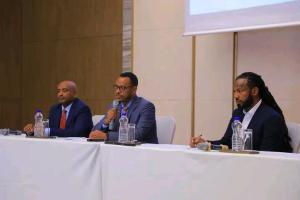
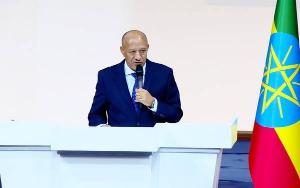
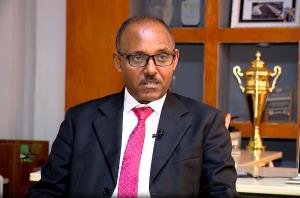
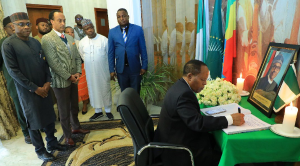
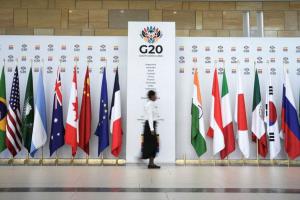






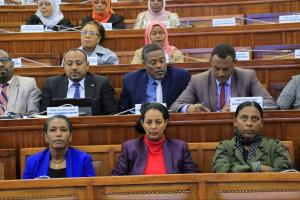

.jpg)
.jpeg)

.jpg)
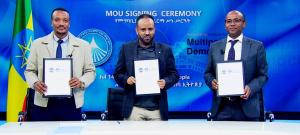
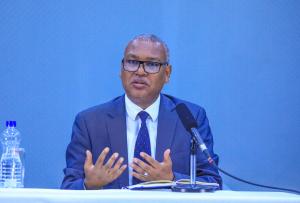
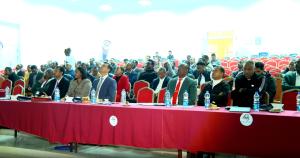
.jpg)
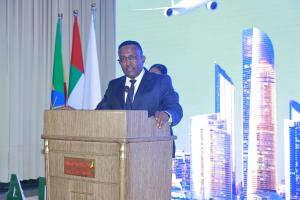
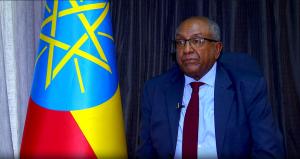


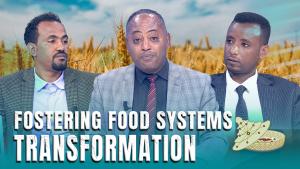
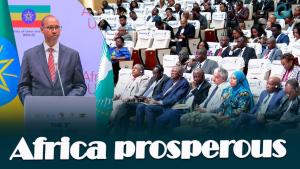
.jpg)
.png)

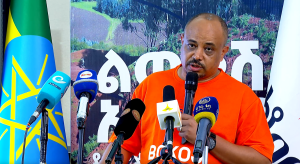
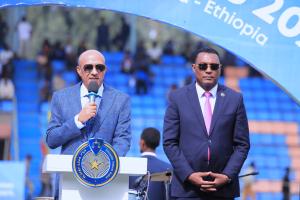

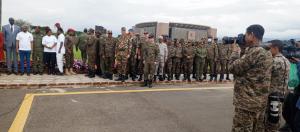


.jpg)

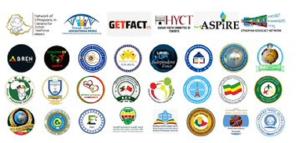

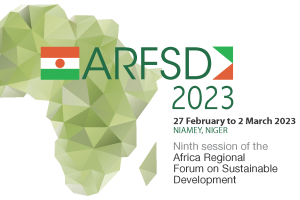
.jpg)
.jpg)